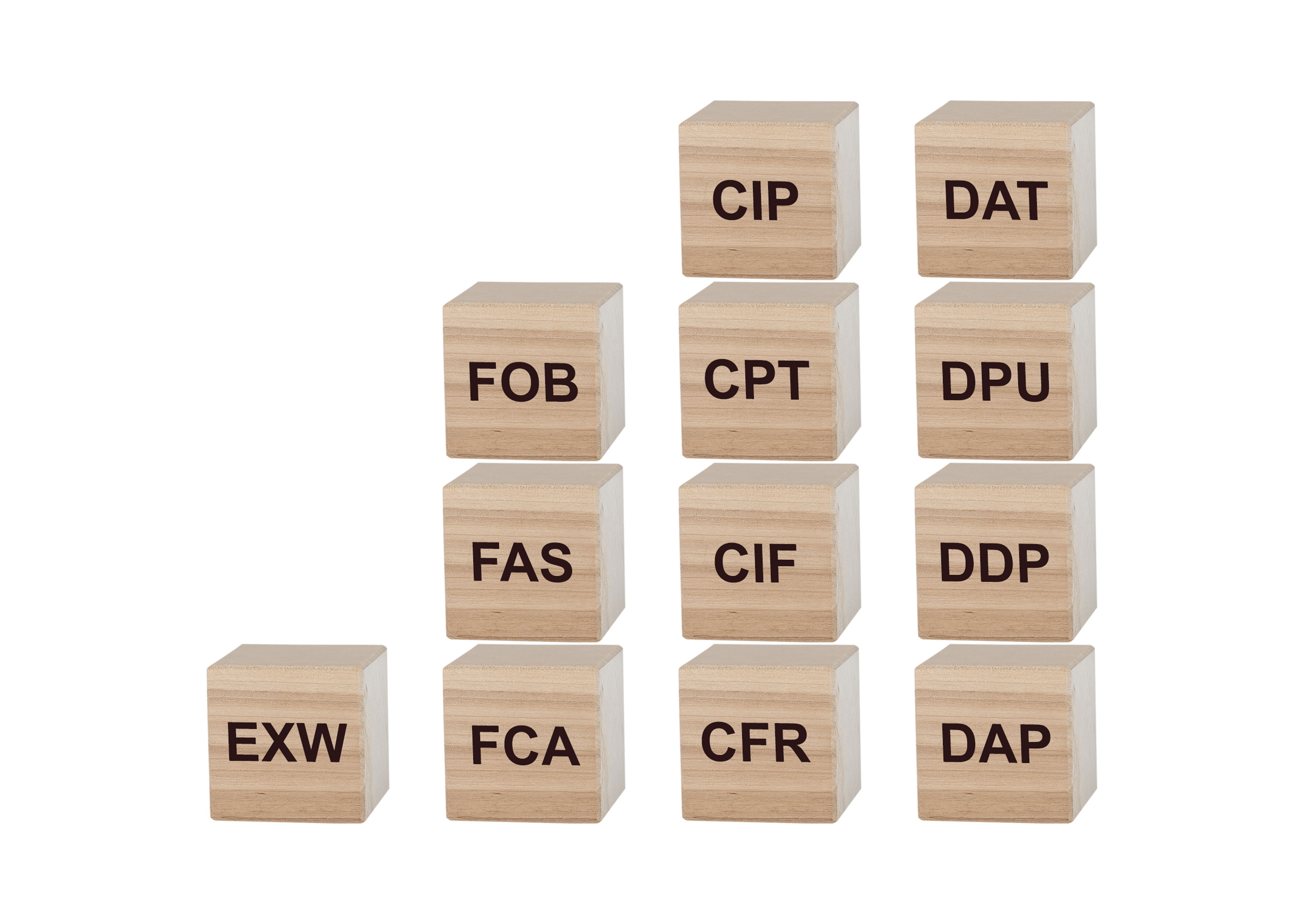INCOTERMS


LIST OF ALL 11 INCOTERMS
- EXW – Ex Works: The seller’s responsibility is to make the goods available for pickup at the warehouse or factory. From that point forward, the buyer assumes responsibility for all costs and risks. For most importers and exporters, this means working with a freight forwarder that arranges the entire shipment, starting at pickup from the factory.
- FCA – Free Carrier: The seller is responsible for delivering the goods to the carrier at a named place, which is usually the terminal or a warehouse. Once the goods are handed over to the carrier, the risk transfers to the buyer.
- CPT – Carriage Paid To: The seller is responsible for the costs of transporting the goods to a named destination. Responsibility transfers to the buyer once the goods are delivered to the agreed-upon destination.
- CIP – Carriage and Insurance Paid To: This incoterm is the same as CPT except that with CIP, the seller much also arrange and pay for insurance coverage in case of loss or damage to the goods during transit to the agreed-upon destination.
- DAP – Delivered at Place: The seller is responsible for arranging the entire shipment up to delivering the goods to a named place. Risk transfers to the buyer upon delivery. The seller is responsible for clearing goods for export but the buyer assumes responsibility for import customs duties, fees, and taxes.
- DPU – Delivered at Place Unloaded: The seller is responsible arranging the shipment and delivering the goods to a named place. They are also responsible for unloading them. Risk transfers to the buyer once the goods are unloaded.
- DDP – Delivered Duty Paid: The seller is responsible for entire shipment, including customs clearance and fees, and delivering the goods to the buyer’s premises. This incoterm places the maximum responsibility on the seller.
- FAS – Free Alongside Ship: The seller is responsible for picking up the goods at the factory, clearing them for export, and delivering them to a departure location, usually the ship loading dock. Tisk transfers to the buyer when the goods are placed alongside the ship; they are responsible for the main leg of transit and every other step in delivery.
- FOB – Free On Board: The seller is responsible for packaging, pickup, and delivery of goods onto a vessel at the port of shipment. Liability transfers to the buyer once the goods are on board the vessell; the buyer is responsible for every other step of the journey.
- CFR– Cost and Freight: The seller is responsible for transportation to the port of origin and for loading the goods onto the vessel. They are also responsible for transportation to the destination port – but they are not liable for that portion of the journey. Instead, risk transfers to the buyer when the goods are on boarded at the origin port.
- CIF – Cost, Insurance, and Freight: Similar to CFR, but the seller also arranges and pays for insurance coverage for the goods during transit to the port of destination.
2020 Incoterms
The 2020 Incoterms, updated from the 2010 Incoterms, are a set of international trade terms that define the responsibilities and obligations of buyers and sellers when shipping goods. They are designed to facilitate smooth and efficient international trade by providing standardized rules for the delivery of goods, payment, risk transfer, and other key aspects of international transactions.
2020 Incoterms Rules for Any Mode of Transport
Whatever mode of transport you use – sea, air, road, or rail – you’ll need to choose your incoterm. However, not every incoterm can be used for every mode.The following seven incoterms can be used for both ocean and air shipping:
EXW – Ex Works
FCA – Free Carrier
CPT – Carriage Paid To
CIP – Carriage and Insurance Paid To
DAP – Delivered at Place
DPU – Delivered at Place Unloaded
DDP – Delivered Duty Paid
2020 Incoterms for Sea and Inland Waterway Transport
These four incoterms can be used for sea and inland waterway shipments only:
FAS – Free Alongside Ship
FOB – Free On Board
CFR – Cost and Freight
CIF – Cost, Insurance, and Freight
2010 Incoterms
The International Chamber of Commerce (ICC) updates incoterms every ten years or so. Prior to 2020, the last update was in 2010. The 2010 version was largely similar to the 2020 version. However, in 2020 some changes and clarifications were made to better reflect modern trade practices and technology.
Using 2010 Incoterms After 2020
It is generally advisable to use the most current set of Incoterms – that is, the 2020 Incoterms. These updated terms are designed to reflect modern trade practices and provide more clarity and specificity, which can help reduce misunderstandings and disputes in international trade. However, it is not prohibited to use the 2010 Incoterms if both the buyer and seller agree to do so. It’s essential to clearly specify in the sales contract which set of Incoterms is being used to avoid any confusion or disputes.
Why are Incoterms Important in 2024?
Importers and exporters should consider which incoterms is best for them before the contract of sale is negotiated. This can prevent surprise costs and unnecessary complications.Choosing an incoterm means getting on the same page as your supplier – it aligns everyone on shipping procedures when multiple parties and stakeholders are involved. These globally accepted terms ensure the timely payment of goods, services, and duties, while protecting suppliers, carriers, and buyers.


